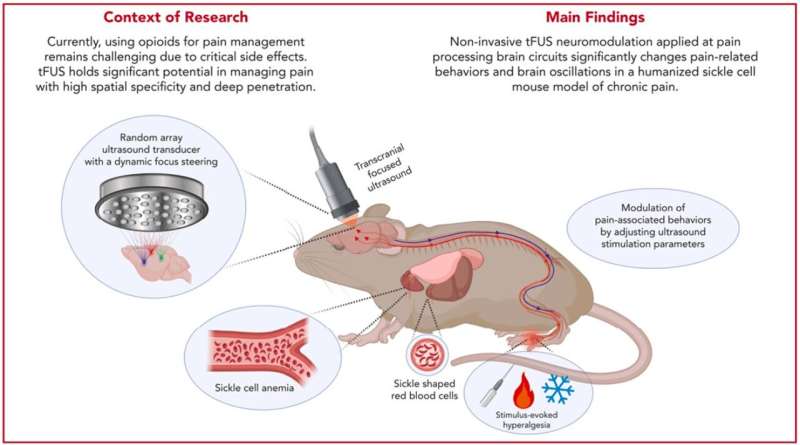This article has been reviewed according to Science X's editorial process and policies. Editors have highlighted the following attributes while ensuring the content's credibility:
fact-checked
peer-reviewed publication
trusted source
proofread
Noninvasive focused ultrasound show potential for combating chronic pain

Chronic pain impacts an estimated 20% of the world population and persists as a frustrating symptom for innumerable health issues, from sickle-cell disease to arthritis.
As part of his lab's committed focus to improving noninvasive technology solutions for human health, Bin He of Carnegie Mellon University is developing noninvasive neuromodulation strategies to serve as an alternative to pharmaceuticals for combating chronic pain.
In a promising development, the He group's latest work demonstrates the effectiveness of a novel technology that is able to stimulate and modulate specific brain circuits with sub-millimeter spatial precision and successfully suppress pain hypersensitivity.
Medication is the go-to treatment for pain, while severe chronic pain conditions are often treated with opioids, which bear many side effects and also raise concerns of addiction, misuse and even overdose.
In juxtaposition, the technology He's group is developing and evaluating, transcranial focused ultrasound (tFUS) modulation, is safe, reversible, and noninvasive. Among the canon of non-invasive neuromodulation approaches, tFUS also demonstrates exceptional advantages in modulating brain activities with high spatial specificity and deep brain penetration.
"We demonstrate, for the first time, in a series of rigorous preclinical studies, that precise focused ultrasound neuromodulation at multiple brain targets can significantly change pain-associated behaviors," said He, professor of biomedical engineering at Carnegie Mellon University.
"There is an urgent clinical need to develop non-pharmacologic and non-invasive neuromodulation strategies to treat pain, and Carnegie Mellon University is at the forefront of this emerging field."
The study, published in Blood, involved 130 animal subjects and more than five years of meticulous research. As a next step, the group plans to conduct clinical testing in humans with their novel technology in the near future.
"The impact of this work extends across health care and also the medical device industry," He said. "With 1.5 billion people suffering from chronic pain, this technology has meaningful societal impact. It can be generalized to treat various pain types and is equitable in terms of cost and portability.
More information: Min Gon Kim et al, Low-intensity transcranial focused ultrasound suppresses pain by modulating pain-processing brain circuits, Blood (2024). DOI: 10.1182/blood.2023023718




















